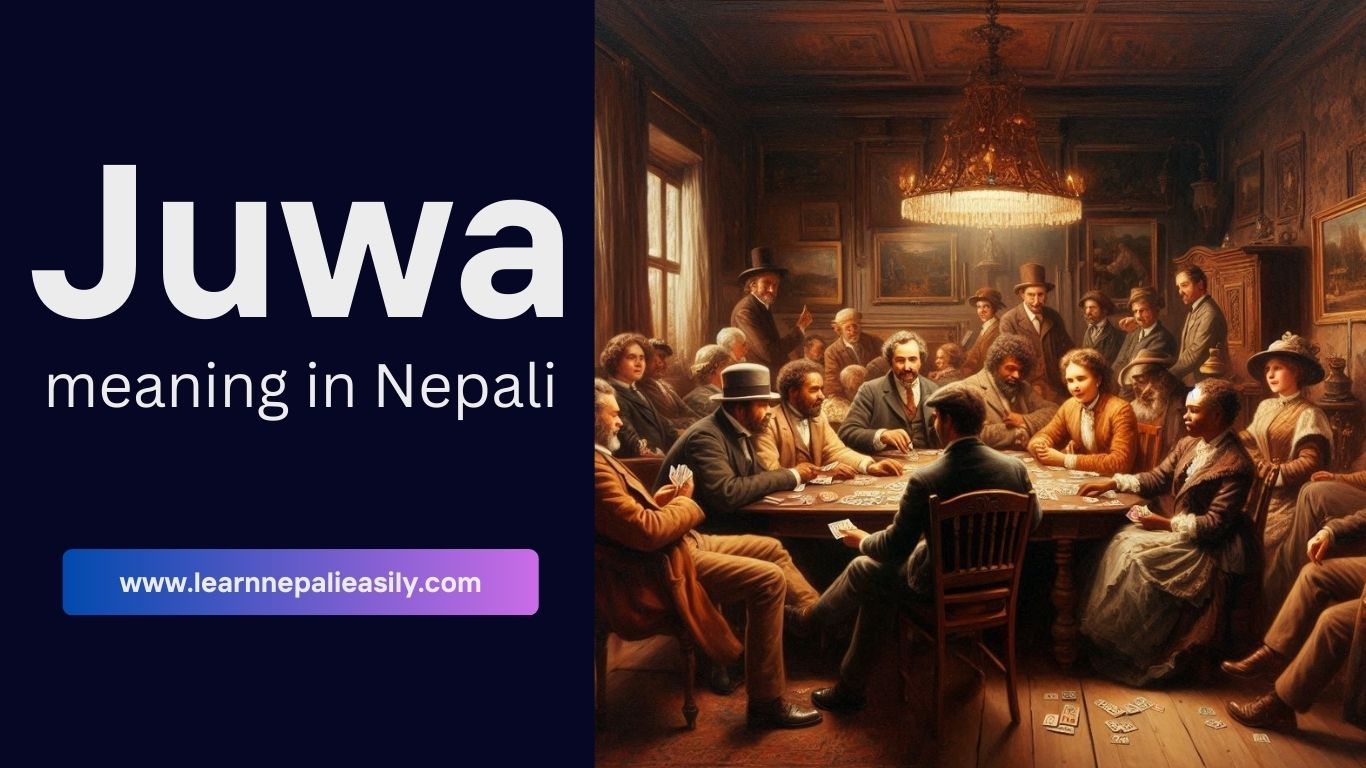The term “juwa” holds a significant and controversial place in Nepali society. It refers to gambling, a practice where individuals bet money or valuable items in the hopes of winning more. In Nepali, “juwa” is often associated with risk, addiction, and, in many cases, family and societal conflicts. In this blog, we will explore the meaning of “juwa,” its cultural implications, and its effects on Nepali society.
What Does “Juwa” Mean in Nepali?
जुवा (Juwa) refers to the act of gambling. This can involve different types of betting, whether on games of chance like cards, dice, or sports. In many countries, including Nepal, gambling is considered illegal in most forms, but it still exists in various pockets of society.
Nepali people sometimes engage in “juwa” during festivals like Tihar. While casual gambling during festivals may seem harmless, addiction to “juwa” can have severe consequences for individuals and families.
Nepali Sentences Using “Juwa”
Nepali: जुवा खेल्नाले धेरै मान्छेले सबै सम्पत्ति गुमाउँछन्। (Juwa khelna le dherai manche le sabai sampatti gumauchhan.)
English: Many people lose all their wealth by gambling.
Nepali: जुवा खेल्नु कानुनी रुपमा गलत छ। (Juwa khelnu kanuni rupma galat cha.)
English: Gambling is legally wrong.
Nepali: उसले जुवा खेल्नाले घर बेच्नुपर्यो। (Usle juwa khelnale ghar bechnu paryo.)
English: He had to sell his house because of gambling.
Nepali: जुवाले पारिवारिक सम्बन्धमा तनाव ल्याउँछ। (Juwa le pariwarik sambandh ma tanab lyaucha.)
English: Gambling causes stress in family relationships.
The Cultural Context of “Juwa”
In Nepal, gambling or “juwa” is not openly accepted in society, yet it continues to be practiced, especially during certain festivals. The most common time when “juwa” becomes socially visible is during Tihar, one of the biggest Hindu festivals celebrated in Nepal.
Gambling Addiction:
While gambling during festivals is usually light-hearted, “juwa” can quickly turn into a dangerous addiction. Gambling addiction is a growing problem in Nepal, as some people continue betting even after losing large amounts of money. This addiction often leads to severe financial problems, broken relationships, and social stigma.
Example:
Nepali: जुवाको लतले उसको जीवन बर्बाद भयो। (Juwako laat le usko jiwan barbaad bhayo.)
English: His life was ruined by gambling addiction.
Legal Implications of “Juwa”:
In Nepal, gambling is generally illegal. The law prohibits most forms of gambling outside of regulated environments, such as casinos that cater primarily to tourists.
Example:
Nepali: जुवा खेल्न कानूनले अनुमति दिदैन। (Juwa khelna kanoon le anumati didaina.)
English: The law does not permit gambling.
The Negative Effects of “Juwa” on Nepali Society
Financial Loss:
One of the most immediate consequences of gambling is financial ruin. Many Nepali families have lost significant wealth due to “juwa,” and some even face bankruptcy. The lure of winning big can push people to keep betting until they’ve lost everything.
Example:
Nepali: जुवाले गर्दा मानिसहरूले आफ्नो सम्पत्ति गुमाउँछन्। (Juwale garda manisharule afno sampati gumauchan.)
English: Gambling causes people to lose their property.
Broken Families:
Gambling addiction often leads to broken families. The stress of losing money can lead to arguments, distrust, and eventually divorce or separation. The impact is not just on the gambler but on their entire family.
Example:
Nepali: जुवाले हाम्रो परिवारमा झगडा ल्याएको छ। (Juwa le hamro pariwar ma jhagada lyaeko cha.
English: Gambling has brought conflict to our family.
Social Stigma:
People who gamble regularly often face social stigma in Nepali society. They are seen as irresponsible and incapable of managing their lives, which can lead to isolation and further problems.
Example:
Nepali: जुवा खेल्नेले समाजमा राम्रो प्रतिष्ठा पाउँदैनन्। (Juwa khelnele samaj ma ramro pratishtha paudainan.)
English: Gamblers do not gain good reputation in society.
Mental Health Issues:
Gambling addiction can also lead to severe mental health issues such as depression and anxiety. Constant losses, the stress of debts, and the pressure from family members can push individuals into a state of despair.
Example:
Nepali: जुवाले मानसिक स्वास्थ्यमा असर पर्छ। (Juwa le mansik swasthya ma asar parchha.)
English: Gambling affects mental health.
Legal Gambling in Nepal: Casinos
While most forms of “juwa” are illegal in Nepal, casinos are legal but heavily regulated. These casinos are primarily meant for foreign tourists, and Nepali citizens are not allowed to gamble inside them. Casinos offer a wide range of gambling activities, including card games and slot machines.
Example:
Nepali: नेपालका क्यासिनोहरूमा नेपालीलाई जुवा खेल्न अनुमति छैन। (Nepalka casinoharuma Nepalilai juwa khelna anumati chaina.)
English: Nepalis are not allowed to gamble in Nepali casinos.
Conclusion
“Juwa,” or gambling, is a practice that has both cultural and legal implications in Nepal. Excessive gambling can lead to serious financial, familial, and social problems.

